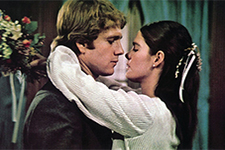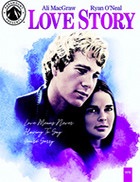Love Story
|  The 1960s in Hollywood ended with a run of youth-centered counterculture movies that have since come to define the perceived ethos of that era: Easy Rider (1969), Alice’s Restaurant (1969), Medium Cool (1969), Getting Straight (1970), The Strawberry Statement (1970), and Joe (1970), just to name a few. These films were fueled by the zeitgeist, but as many have pointed out, were also calculated to take advantage of the growing youth market for movies, which had fed heavily on European art film over the previous decade and was primed for politically attuned stories about the here and now. But, at the same time, there was a significant political retrenchment in the works, and the year 1970 marked a decided shift, with the box office being dominated by old-school studio genre fare like Airport, Patton (which also won that year’s Oscar for Best Picture), and Ryan’s Daughter. There were still some counterculture hits, of course, notably Robert Altman’s subversive war satire M*A*S*H and the documentary Woodstock, but overall the tide that year was shifting back toward something more familiar, safe, and routine. Sitting atop that movement was Love Story, which was the highest grossing hit of 1970 and arguably the film that helped to save Paramount after a string of flops in the late 1960s. More of an unlikely phenomenon than a movie, it began life as a screenplay by a Yale classics professor named Erich Segal, who had already penned a handful of films, including the animated Beatles musical Yellow Submarine (1968), which he co-wrote with three others, and Stanley Kramer’s largely forgotten campus protest drama R.P.M. (1970). The screenplay for Love Story found its way into the hands of Robert Evans, who was then Paramount’s executive vice president in charge of production, who recognized it as an ideal vehicle for his new wife, Ali McGraw, whose star was on the rise after her leading role in Goodbye, Columbus (1969). It was Evans who encouraged Segal to write a novelization of the screenplay, which was published on Valentine’s Day in 1970 and rocketed up the bestseller list, becoming an instant literary phenomenon. Thus, when the film opened 10 months later in December, its title, its story, and its pithy catchphrase “Love means never having to say you’re sorry” were already fully embedded in American culture. Pre-sold to the max, Love Story, whose very ethos was simplicity and brevity, was everywhere. That also meant that everyone knew it was a tragedy. And if they didn’t, the film tells you in its opening shot, as we are introduced to the blandly handsome protagonist Oliver Barrett IV (Ryan O’Neal) sitting alone on some bleachers overlooking a frigid, empty ice skating rink, while he asks in voice-over, “What can you say about a 25-year-old girl who died?” The girl in question is Jenny Cavilleri (Ali McGraw), with whom Oliver fell in love while they were in college. It is a classic Romeo & Juliet scenario updated for the Upper East Side: While Oliver comes from a wealthy, privileged family and is on track at Harvard to attend law school, Jenny is from a working-class background and is studying music at Radcliffe. She is smart, witty, and cutting, and Oliver, whose life has always been set for him, is immediately attracted to her realness. His dour parents (Ray Milland and Katharine Balfour) don’t approve of the relationship, whereas her widowed father (John Marley) is so generous and accepting that he doesn’t even seem to mind when Jenny casually informs him that she is now an atheist. The crux of the story is that, against all odds, Oliver and Jenny are perfect for other, but fate in the form of some unnamed disease (most likely leukemia) is destined to destroy their union when it is still new and perfect. Thus, the social and economic struggles of the film’s first half, which Oliver and Jenny overcome with their purity of commitment and love, pales in comparison to Jenny’s physical demise, which all the love in the world cannot stop. Director Arthur Hiller had recently graduated from the ranks of television and had been steadily making features since the early 1960s, all of which, except for the war drama Toburk (1967) with Rock Hudson, were comedies. He had worked with a number of cemented and rising stars, including Natalie Wood in Penelope (1966) and Warren Beatty in Promise Her Anything (1964). Love Story was his first dramatic romance, but he clearly understood the story’s simple power and the need for him to stand back and let his two glowing co-stars work the screen, supplemented, of course, by French composer Francis Lai’s instantly memorable, Oscar-winning score. Hiller leans heavily on the basics of the narrative and keeps the film’s style simple and unadorned, perhaps recognizing that audiences, after all the political turbulence on-screen and off, might appreciate a respite. And Love Story works overtime to avoid politics, as the story appears to be taking place in a vacuum in which words like Vietnam, Nixon, drugs, and racial unrest don’t exist. The film’s only nod toward any kind of socio-political tension is purely economic, as the class difference between Oliver and Jenny gives rise to his expulsion from his family—an old story if ever there were one. Yet, Love Story was a smash, its inadequacies ignored in favor of the tears it wrung and the heartstrings it plucked. It was also something distinctly different at the time—a throwback to a different cinematic era that some people missed and others didn’t realize they were missing. As the reviewer in Variety noted at the time of its release, it is “a rare breath of fresh air in the smog of cinema psychosis.” It is too easy to call it shameless, and to do so requires its own kind of shamelessness that refuses to recognize the cathartic pleasure of tragedy, or, in modern parlance, a good cry. Love Story is not a particularly great movie, but it works in the way that it is meant to. It is simple almost to a fault, but it is not dishonest. It wears its heart on its sleeve and makes no apologies (remember what love means ...), and more than anything that is what audiences responded to then and continue to respond to today.
Copyright © 2021 James Kendrick Thoughts? E-mail James Kendrick All images copyright © Paramount Home Entertainment | |||||||||||||||||||||||||||||
Overall Rating: 

 (2.5)
(2.5)


